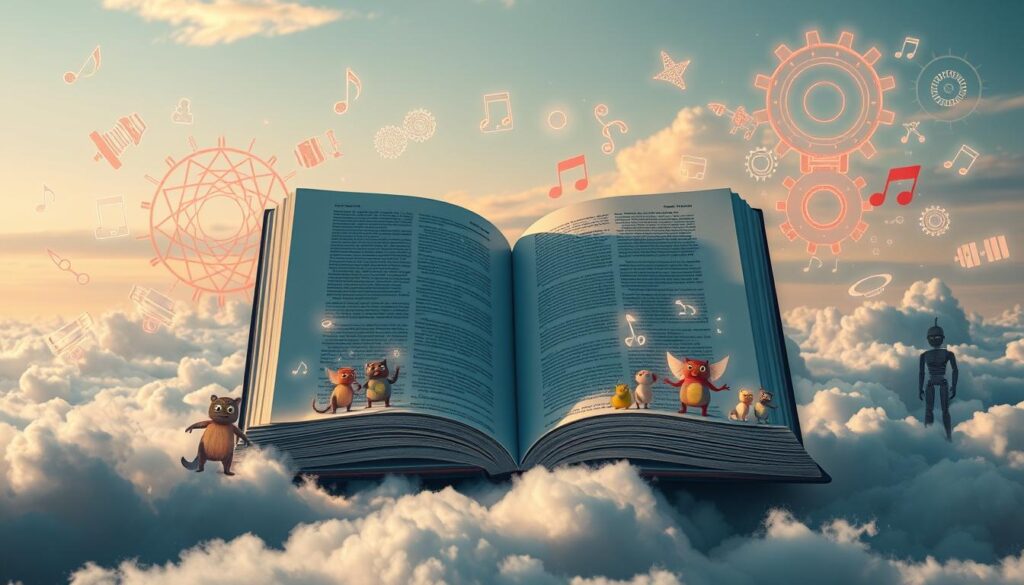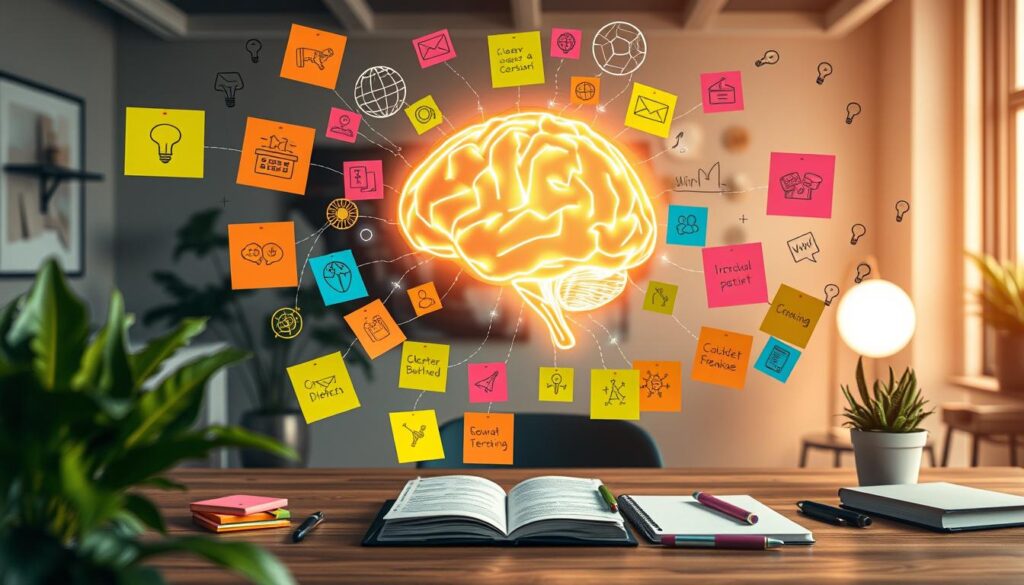“The best way to predict the future is to invent it.” – Alan Kay. This quote captures the growing interest in AI tools like ChatGPT in the writing world. Authors are looking for efficient ways to tell their stories, raising the question: Is it okay to use ChatGPT to write a book? ChatGPT for book writing marks a significant shift, merging technology and creativity in new ways. While many authors see potential, concerns about originality, literary integrity, and personal expression remain.
As Fredrick Eghosa points out, a group of 17 authors, led by the Authors Guild, has sued OpenAI in 2023. They accuse it of “systematic theft on a mass scale”1. This highlights the core debate: does AI in writing compromise artistic authenticity? Despite this, ChatGPT offers benefits like time savings, enhanced creativity, and improved writing skills12. The ethical implications of AI and the practical challenge of maintaining personal writing style open up a complex discussion. It’s about how AI can coexist with human creativity.
The emergence of ChatGPT challenges traditional writing paradigms, inviting us to explore new storytelling possibilities.
Key Takeaways
- ChatGPT can save time and overcome writer’s block, making it a valuable asset in book writing.
- Concerns about originality and authenticity remain vital considerations for authors using AI.
- Justice for authors may impact the way AI writing tools develop in the future.
- Combining AI suggestions with one’s writing style can enhance creativity and productivity.
- Understanding the limitations of AI tools is crucial for successfully integrating them into the writing process.
Understanding ChatGPT’s Role in Writing
ChatGPT, developed by OpenAI, is a cutting-edge AI tool for authors. Launched in late 2022, it quickly became popular among writers looking to enhance their creative process3. It uses two models: GPT-3.5, available for free, and GPT-4, which requires a ChatGPT Plus subscription for $20 a month3. Key features include the Code Interpreter and Custom Instructions, which allow for personalized guidance3.
What is ChatGPT?
ChatGPT can generate text for various writing tasks, drawing from a vast internet dataset. It aids in brainstorming, creating outlines, and developing characters3. While it’s efficient, over-reliance might stifle original thinking, as users might just tweak AI suggestions rather than create unique content4.
How Does ChatGPT Generate Text?
ChatGPT’s text generation is based on deep learning algorithms that analyze and synthesize data. However, it often lacks the emotional depth and storytelling nuance that human authors bring4. Studies show 87% of users use ChatGPT to speed up writing and simplify content creation5. To get the most out of ChatGPT, writers should provide clear prompts and context, enhancing narrative coherence and character development5.
The Advantages of Using ChatGPT for Writing
ChatGPT brings numerous benefits to the writing process, making it more efficient and enjoyable for authors. It excels in ChatGPT book authoring, offering time savings, creative boosts, and ease of use for new writers. ChatGPT can rapidly generate content, which is a huge time-saver, especially for those with tight deadlines67. It acts as a powerful tool for book writing, suggesting ideas when authors face writer’s block87.
Time Efficiency
ChatGPT’s primary advantage is its ability to boost productivity. It can produce text quickly, freeing authors to refine their ideas without getting bogged down in the initial draft8. This is especially beneficial for those with deadlines to meet or multiple projects to manage7.
Boosting Creativity
ChatGPT acts as a creative partner, offering inspiration and innovative ideas. It provides diverse prompts and suggestions, enhancing creativity and making writing more enjoyable6. This is particularly helpful when authors hit creative blocks or are unsure about their narrative direction8.
Accessibility for New Writers
ChatGPT is designed for aspiring writers who might find book writing daunting. It makes the writing process more accessible, helping those new to writing to organize and express their ideas more effectively7. This accessibility allows new authors to explore their writing styles and build confidence in their abilities6.
Potential Challenges When Using ChatGPT

ChatGPT brings many benefits, but it also presents challenges for writers. One major issue is the ChatGPT and originality problem. Although it can produce coherent and grammatically correct text, it often lacks the unique creativity and personal touch of human writers. This can result in outputs that lack distinction and vibrancy, which is a drawback for authors aiming to create distinctive narratives. This concern underscores the Lack of human touch in AI writing, as emotional depth and nuanced storytelling may be overlooked in favor of efficiency.
The reliance on AI writing tools, like ChatGPT, is another challenge for writers. Authors might become too dependent on these digital assistants, potentially stifling their creativity and personal growth. This over-dependence could lead to a loss of their original voice and stylistic choices. Therefore, it’s crucial for writers to find a balance between using AI capabilities and maintaining their personal writing style. By being aware of these challenges, authors can effectively use ChatGPT while preserving their unique storytelling abilities91011.
Ethical Considerations in AI Writing
Writers using AI tools like ChatGPT face numerous ethical dilemmas, especially regarding copyright and authorship. The content generated by these tools often draws from a vast array of existing materials. The Authors Guild advises authors to use AI tools ethically, including disclosing AI-generated content to publishers and readers12. This advice reflects growing concerns in the literature community about AI-assisted work ownership and originality.
Copyright Issues
Copyright issues with AI are a major topic in AI writing ethics discussions. The debate centers on whether authorship can accurately reflect the collaborative nature of AI-generated content. Amazon has implemented a policy requiring authors to disclose AI-generated content when publishing through Kindle Direct Publishing (KDP)12. This move aims to ensure transparency and uphold trust in creative authenticity.
Authorship Attribution
The question of authorship and AI-generated content adds complexity to literary creation. As AI becomes more involved in narrative development, there’s a growing debate about author credit for works with significant AI input. The issue transcends legal definitions, touching on ethical concerns. Excessive AI use could lead to a flood of generic and clichéd stories13. Moreover, evolving publishing practices prompt discussions on how authors can maintain their creative integrity while working with AI technologies14.
Ensuring Quality Control in AI-Generated Text

Ensuring quality in AI content is vital to convey the intended message effectively. Writers must understand the importance of editing AI writing with precision. This involves actively guiding the AI, rather than solely relying on it, to improve the narrative and boost creativity.
Importance of Editing
Editing is key in refining AI-generated text. It allows authors to infuse their unique styles and correct any inaccuracies. By using ChatGPT during the editing phase, writers can receive feedback and suggestions for improvement15. This highlights the necessity of a human touch to uphold quality standards.
Collaborating with Human Writers
Collaboration between writers and AI can lead to more original content. The writing process includes brainstorming, outlining, and revisions. ChatGPT can assist in generating ideas and outlines, freeing authors to focus on their storytelling15. This partnership not only improves writing quality but also addresses concerns about authorship and integrity, minimizing risks in publishing AI-generated content16.
Tailoring ChatGPT to Individual Writing Styles

Personalizing ChatGPT writing is crucial for authors who aim to express their unique voices through AI-generated content. Tailoring writing styles is achieved by crafting Custom prompts for AI that mirror the author’s intent. This method enables writers to steer the AI towards producing text that mirrors their personal style and narrative voice.
Customizing Prompts for Better Results
Writers should offer ChatGPT detailed prompts to enhance the likelihood of receiving text that matches their desired tone and structure. Authors can share examples of their writing style and specific elements they wish to replicate, such as tone and language usage. This interaction aids in establishing a writing framework that effectively captures the author’s voice.
Incorporating Personal Voice
Integrating personal voice into AI-generated text ensures authenticity for authors. Through iterative refinement and adjustments, writers can preserve their unique voice. This process demands continuous evaluation to achieve the desired outcome, highlighting the need for collaboration between the author and AI. Such meticulous attention to detail results in tailored content that genuinely reflects the writer’s identity, enhancing reader relatability171819.
Case Studies: Successful Books Written with AI Assistance

Delving into the world of books written with AI offers insights into using technology in writing. Many writers are studying case studies using ChatGPT to find effective strategies. These examples teach authors about collaboration and innovation in writing.
Notable Examples
AI tools show their worth in content creation. An author saved a week of work on a non-fiction project with AI’s help. AI can help with brainstorming, market research, and even eBook titles20. AI chatbots can write in minutes, allowing authors to draft books quickly20.
Lessons Learned from Each Case
AI can be a valuable aid, but it comes with challenges. ChatGPT has faced criticism for not always meeting reader expectations, raising concerns about originality and quality21. Authors must be aware of AI’s limitations, like its sensitivity to prompts, which affects output quality21. It’s also crucial to fact-check AI content, as it can be inaccurate and needs human verification21. These lessons underscore the importance of using AI wisely in writing, balancing technology with a human touch.
The Future of AI in Literature

The world of literature is undergoing a profound transformation, thanks to advancements in artificial intelligence. This change is marked by the growing collaboration between human authors and AI systems. The introduction of ChatGPT has significantly boosted the creation of written content across various genres. This includes non-fiction, science fiction, and children’s literature22. As more writers embrace AI in their work, the AI impact on publishing is becoming more apparent. This is prompting both authors and publishers to rethink their approaches.
Trends in AI-Assisted Writing
One trend gaining traction is the use of large language models like ChatGPT for crafting extensive written works. For example, an AI-generated book inspired by George R.R. Martin’s style reached an impressive 683,276 words. This shows AI’s capability to create detailed narratives23. Moreover, AI’s creative potential extends to emotional writing, as seen in journalist Vauhini Vara’s interactions with GPT-3. This highlights AI’s ability to produce relatable content23. Authors like Sean Michaels have also noted AI’s skill in mimicking various writing styles, enriching the literary world23.
Potential Impact on the Publishing Industry
The rise of AI assistance in writing is reshaping the literature and AI evolution, challenging traditional publishing models. Self-publishing platforms like Kindle Direct Publishing face increased competition, making it harder to grab reader attention22. The debate over AI’s ability to mimic existing authors also raises ethical concerns about authorship and originality. This has sparked discussions on how future copyright laws might address these issues24.
As the conversation around AI’s role in literature continues, it’s crucial to balance the opportunities and concerns. This ensures that the creative heart of writing remains intact, even as technology advances.
Experts speculate that AI’s impact on writing could mirror photography’s influence on painting, leading to new forms of experimentation and creativity in literary expression24.
How to Get Started with ChatGPT for Writing

For writers looking to dive into AI-assisted writing, choosing the right tools is key. Starting with Getting started with ChatGPT is straightforward when you pick platforms that meet your specific needs. ChatGPT, built by OpenAI with GPT-3.5 technology, is popular for its ease of use and quick, human-like responses25. It can greatly boost your creative output.
Choosing the Right Platform
Finding the best platforms for AI writing is crucial for using ChatGPT effectively. Many platforms offer different features, so it’s important to find the one that aligns with your writing goals. Exploring platforms with robust features will enhance your experience as you start with Getting started with ChatGPT.
Best Practices for Integrating AI
When using ChatGPT effectively, setting clear goals is essential. Writers should manage their pace and understand the AI’s content generation speed; ChatGPT can produce under 1,000 words in seconds26. This speed highlights the need for thorough editing to avoid inaccuracies or less informative content26. Human oversight is crucial for blending creativity and efficiency, leading to a compelling final product. For those aiming to write a novel with AI help, generating pitches and refining content flow are key steps to success in writing a full-length novel effectively.
Balancing AI and Human Input in Writing Projects

Authors must find a balance between AI and human touch to create engaging content. In collaboration in writing, knowing when to use tools like ChatGPT is crucial. It’s important to let each author’s unique voice and emotional depth shine through, connecting with the audience.
Finding the Right Mix
AI tools can boost writing productivity, but finding the right balance is key. A neutral sentiment exists when AI-generated stories are transparently shared with readers27. Many authors enjoy the traditional writing process, valuing narratives that reflect their personal insights and feelings27. Successful collaboration often means letting AI handle specific tasks while keeping creative decisions with the author.
Encouraging Human Creativity
AI’s capabilities are intriguing, but human experiences and emotions are at the heart of writing. These aspects are hard to replicate with algorithms, making it vital for writers to remain actively involved. A webcomic artist, for example, uses an algorithm for coloring and shading, freeing her to focus on content27. This approach shows how enhancing creativity with AI can preserve personal touch. The blend of mechanical and imaginative elements creates a space for genuine storytelling.
Addressing Common Misconceptions About AI Writing

Many people fear AI writing will replace human creativity. These myths about ChatGPT hide its true capabilities and limits. It’s vital to understand AI writing to use it wisely.
Myth vs. Reality
One myth is AI writing tools can create content as good as humans. ChatGPT can produce quality stories, but it lacks the unique touch of exceptional writing28. There’s worry students might use ChatGPT to cheat, raising concerns about academic integrity29. Also, AI advancements like ChatGPT could lead to job losses, questioning the future of work29.
Understanding AI Limitations
AI writing has clear limits. It relies on inferences from vast content, lacking personal experience and emotional depth28. ChatGPT might boost efficiency but can’t match the creativity and empathy of great stories29. OpenAI’s ongoing improvement highlights the need for responsible AI use29.
Reader Reactions to AI-Generated Content

The world of literature is undergoing a transformation, with reader reactions to AI writing playing a crucial role. Surveys reveal a wide range of opinions on AI-generated content, from skepticism to growing acceptance. For example, GPT-3, the core of ChatGPT, has been trained on about 500 billion tokens from various sources. This training enables it to mimic human writing styles30. AI writing can thus cater to different tastes, offering a variety of themes and tones.
Survey Insights
Recent studies show that many readers are cautiously optimistic about AI-generated books. Despite some literary agents and publishers’ initial hesitation11, readers are slowly warming up to the idea. They see AI as a means to enhance human creativity, rather than replace it. The ability of AI to incorporate personal elements into its writing, mirroring human authors, boosts this acceptance.
Embracing Change in Literature
AI’s versatility in literature is promising. It can create poetry and prose that connects with readers on various levels31. As discussions about writing’s future intensify, authors must adapt. They need to redefine their view of AI assistance in their creative work. Addressing concerns about AI-generated content is essential for its wider acceptance in the literary world.
Developing a Personal Writing Workflow with AI

Creating a successful writing workflow with AI tools can dramatically enhance an author’s productivity and creativity. By setting clear writing goals, writers can maintain focus and direction throughout their projects. This structured approach can be paired with advanced tools like ChatGPT to facilitate the writing process.
Setting Goals
To maximize output, authors should establish clear and achievable goals at the beginning of their writing journey. These goals not only provide motivation but also help in navigating the writing workflow with AI. Goals might include daily word counts or deadlines for chapter completion, which can be effectively managed through regular check-ins and adjustments.
Tracking Progress
Tracking progress with ChatGPT empowers authors to monitor their achievements systematically. By leveraging AI’s analytical capabilities, writers can evaluate their pace and effectiveness, allowing for timely modifications. This ongoing evaluation aids in maintaining a steady trajectory toward both short-term and long-term writing objectives. As writing becomes more efficient, so does the author’s ability to refine their voice and narrative style, ultimately leading to better quality outcomes.
Legal Implications of Using AI in Writing

The rise of AI writing tools, such as ChatGPT, necessitates a deep dive into the legal realm. It’s vital to grasp current laws to tackle the complexities of copyright and potential legal obstacles writers face.
Understanding Current Laws
In the United States, laws clearly state that users retain ownership of AI-generated content, including text and images32. Yet, there’s no provision for copyrighting content created solely by machines32. This raises questions, especially with AI training datasets potentially containing copyrighted works. It sparks debates on the rights of original creators32. Legal expert Ruth Carter highlights the concerns of copyright infringement and potential lawsuits for both users and AI companies33.
Preparing for Future Regulations
As AI tools become more prevalent, companies must think ahead about the legal landscape of AI authorship. Issues like accuracy and the uniqueness of generated content are paramount. Missteps can lead to reputational damage or legal issues33. Authors should prepare for the worst and implement safeguards when using AI writing tools. This approach helps mitigate risks in content creation33.
Gathering Feedback on AI-Led Projects

Authors using AI in their writing must collect feedback. This step is crucial for evaluating the effectiveness and emotional impact of AI-generated content. Beta readers are key in this process, offering insights that help refine the work.
Importance of Beta Readers
Beta readers are indispensable in the feedback process for AI writing. They help authors pinpoint weaknesses and areas for improvement in AI-generated content. Their feedback can highlight aspects that may not connect with readers, leading to a more refined final product.
Authors often find that beta reader feedback guides them in enhancing the emotional depth and clarity of their work. This feedback is invaluable in shaping a narrative that captivates and resonates with readers.
Incorporating Constructive Criticism
Constructive criticism from beta readers is essential for enhancing AI-generated content. This method encourages writers to carefully consider specific feedback. It helps them balance AI efficiency with human creativity.
By integrating these suggestions into their revisions, authors can create a narrative that is both engaging and uniquely personal. As they navigate the use of AI, the insights from beta readers can significantly improve the quality of their writing. This ensures their work connects with audiences on a deeper level.
Conclusion: Embracing AI as a Writing Tool
The evolution of literature has made embracing AI in writing essential. ChatGPT, developed by OpenAI, is a powerful tool for authors. It generates text that mimics human writing, speeding up the creative process. This efficiency helps overcome writer’s block and stagnant ideas.
ChatGPT uses machine learning to offer new insights and suggestions. These contributions enhance the story without losing the human essence of writing34.
Integrating AI into writing requires careful thought to preserve the author’s voice. Authors should balance AI’s speed and consistency with their creativity and emotional depth. This balance creates innovative stories that connect with readers in the AI age34.
The future of writing looks bright with AI and human creativity working together. AI advancements will likely improve narrative generation and character development. As writers adapt to this new landscape, they will create captivating stories that engage audiences for years31.
FAQ
Is it acceptable to use ChatGPT to write a book?
What are the advantages of using ChatGPT for writing?
How does ChatGPT ensure originality in its output?
Are there ethical considerations when using AI for writing?
How can authors maintain quality control when using AI-generated text?
What is the best way to tailor ChatGPT to individual writing styles?
Can you provide examples of books written with AI assistance?
What trends are emerging regarding the future of AI in literature?
How can aspiring writers get started with ChatGPT?
How can authors achieve a balance between AI and human input in writing projects?
What common misconceptions exist about AI writing?
How do readers generally react to AI-generated content?
What should authors consider when developing a personal writing workflow that includes AI?
What are the current legal implications of using AI in writing?
How important is feedback when working with AI on writing projects?
Source Links
- Can You Legally Use ChatGPT to Write a Book
- Can ChatGPT Write My Book? (Step-By Step Process)
- How to Write a Book in ChatGPT: My Complete Process
- Can ChatGPT help you write a book? Here’s why not!
- Writing My First Book, Hoping to Find Out How ChatGPT Can Help
- Pros and Cons for Authors Using ChatGPT | Dean Publishing
- Is Chat GPT good for book writing? – blog
- ChatGPT for writers: does it work?
- Can I Use ChatGPT to Write a Book? 7 Better Writing Ideas
- Mini-Series: Ethical Ways Authors Can Use ChatGPT When Editing | She Writes
- ChatGPT and Publishing: 3 Ways Publishers Are Responding to AI — Alyssa Matesic | Professional Book and Novel Editing
- AI Best Practices for Authors – The Authors Guild
- Is It Ethical to Use Generative AI in Fiction Writing?
- Ethical use of AI in writing assignments
- I cracked the code to writing with ChatGPT. Here’s how you can too…
- A Publisher’s Statement Regarding AI-Written Submissions
- Mini-Series: Ethical Ways Authors Can Use ChatGPT When Writing | She Writes
- How to Train ChatGPT to write like you – It’s That Lady Dev
- Should we use ChatGPT in the UX writing process? • UX Content Collective
- Using AI to Write a Book: Guide to Self-Publishing eBooks
- I wrote a book with ChatGPT — debunk the hype and get to work.
- AI Literature: Will ChatGPT Be the Author of Your Next Favourite Novel? – De Gruyter Conversations
- ChatGPT is great at summarizing books. But will AI ever write a true work of literature?
- How Might AI Like ChatGPT Impact the Future of Writing and Books?
- Can you write a novel with ChatGPT? ⋆ Protagonist Crafts
- How to Write a Book With ChatGPT – Basmo
- Is It Okay to Use ChatGPT or Other AI Writing Just For Fun?
- 7 top misconceptions about ChatGPT and writing – MetaStellar
- What’s the Fuss About ChatGPT, and Should People be Worried?
- When you SHOULD and SHOULDN’T use ChatGPT as a professional writer.
- Can AI really write books?
- Are there any legal or copyright concerns when using ChatGPT-generated content?
- The Realities of Using ChatGPT to Write for You – What to Consider When It Comes to Legalities, Reputation, Search and Originality
- Can ChatGPT Write a Book? – Copymate







